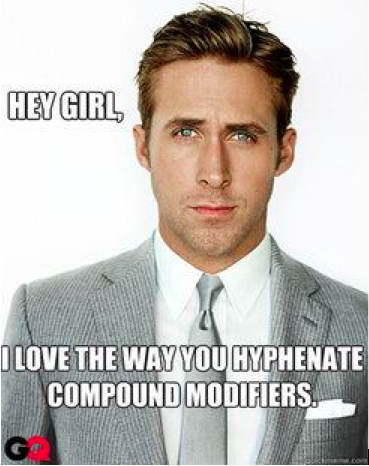
I’ve been asked the question – and have answered it – myriad times, yet I never grow weary of educating others on this mystery of my field.
“Why is this ‘high-school’ hyphenated, but that ‘high school’ isn’t?”
Of course, we’re not talking about actual high schools [or whatever]; we’re talking copy, people.
And the issue is compound-modifier hyphenation.
WAKE. UP. It’s just proper punctuation. Try to stay with me, folks.
Here’s how to know when you need a hyphen and when you can go hyphen-free:
Use a hyphen between two words when they’re being used as a single term modifying [describing] another noun.
EXAMPLE 1: We’re going to bust the high-school students for truancy.
Without the hyphen, it’s as if there’s a comma between the two modifying words, and they both modify the noun separately. So without the hyphen in Example 1, it would mean the students were high students and school students – which may or may not be accurate, but isn’t what we’re trying to communicate here and now.
EXAMPLE 2: We’re going to bust the high school students for drug use.
This is technically correct, but I’d suggest deleting the word “school,” since it seems a little redundant with “students.”
EXAMPLE 3: We’re going to bust the truant senior students for skipping school today.
This needs no hyphen because “truant” and “senior” both describe the noun “students” separately – the students are seniors, and the students are truant.
EXAMPLE 4: We’re going to the high school today to bust students for truancy.
This needs no hyphen between “high” and “school” because “high” is the only modifier, describing the noun “school.”
So …
:: When there are two describing words working together to describe the noun, use a hyphen.
:: When two describing words are working separately to describe a noun, no hyphen.
:: And no hyphen when there’s just one adjective and one noun.
The best example ever of this rule is extra | marital | sex:
Extra marital sex is something most wedded couples wouldn’t complain about.
Extra-marital sex is something most would.
Now, go forth and be the hyphenation hero in your work environment!
Or give me a ring with your latest compound-modifier hyphenation quandry – I’m happy to help.






